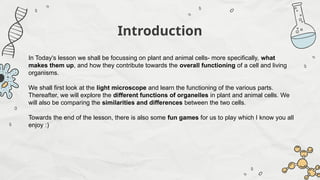Life and Living- Cells. Grade 10, Term 1
- 1. By R. Mahabir Plant and Animal cells
- 2. Introduction In Today's lesson we shall be focussing on plant and animal cells- more specifically, what makes them up, and how they contribute towards the overall functioning of a cell and living organisms. We shall first look at the light microscope and learn the functioning of the various parts. Thereafter, we will explore the different functions of organelles in plant and animal cells. We will also be comparing the similarities and differences between the two cells. Towards the end of the lesson, there is also some fun games for us to play which I know you all enjoy :)
- 3. 01 Cell The basic functional unit of all living organisms Important definitions (Clitheroe, 2011) 04 Eukaryotic Multicellular organisms with a membrane bound and complex nucleus and other organelles- DNA is in nucleus. 02 Organelles The smaller structures within cells 05 Light microscope Light is shone/refracted through a specimen to enlarge it 03 Prokaryotic Unicellular organism with no membrane bound nucleus or other organelles – DNA is in a nucleoid 06 Electron Microscope Beam of electrons (negative) are passed through an object to magnify it
- 5. The Plant and Animal cell- Recap
- 6. Based on what you remember about cells from Grade 7-9, Complete this activity! (Hold ctrl key and click) Don’t worry, if you get stuck. Just hover your mouse on the organelle and it will tell you it's function https://lawrencehallofscience.org/apps/sepup/simulations/cell_sim/ (Hall, 2024)
- 7. Labelled Plant cell (Mokobi, 2020)
- 8. Animal Cell (Haleo, 2016)
- 10. Maintains the plant cells rigid/fixed shape Protection of the plant cells contents Contains 3 strengthening fibres Lignin- strengthening cell wall Pectin – add flexibility cellulose- polysaccharide that makes up cell walls Plasmodesmata- pores joining PLANT cells together- allow for exchange of solutes Middle lamella- Stick adjacent plant cells together Cell wall (Mokobi, 2020)
- 11. Lipid that Adds selectivity to the cell membrane Phosphate molecule 1 Glycogen and 1 fatty acid Allow molecules and solutes to pass through the membrane (Mokobi, 2020) Cell membrane
- 12. Cytoplasm 1. Matrix (fluid) in which all organelles of a cell is suspended within (Mokobi, 2020) 2. Transports substances 3. Allows for chemical reactions to occur in a cell 4. Provides shape to a cell
- 13. Only present in plant cells – assist with regulative and life processes (Mokobi, 2020) Provide colour to the flowers and fruit of plant Stores starch, and produces 3 specialized plastids (Mokobi, 2020) Produce and store starch Stores protein and food Stores fats and lipids Covert into chloroplasts when exposed to light
- 14. Plate-like structure that stores chlorophyll Contains a stack of thylakoids Membrane that joins grana together Store products of photosynthesis Allows chloroplast to replicate itself Provide energy to carry out photosynthesis Main function: Photosynthesis Matrix that all the components of organelles are suspended in. (Clitheroe, 2011) O2 diffuses out, CO2 diffuses in
- 15. 1. Stores water in a plant 2. Prevent excess uptake of water (regulate osmotic potential) 3. Stores minerals, O2, cellular waste and pigments (Mokobi, 2020) Membrane of vacuole
- 16. Main function: Produce ATP for cellular respiration “Powerhouse of the cell” (Mokobi, 2020) Folds= + surface area for cellular respiration Ensures there's enough energy for cellular respiration to take place Allows for replication Convoluted with Cristae Suspends all structures + allows for chemical reactions to take place
- 17. Nuclear pore- transport between the nucleus and rest of the cell Nucleolus- produce rRNA Chromatin- contains genetic material of the cell= chromosomes Nucleoplasm Nucleus= Control functioning of cell (Mokobi, 2020) Contains ribosomes for protein synthesis + package proteins to Golgi body (Mokobi, 2020) In Liver= helps to break down alcohol and lipids (detox process) Protein synthesis
- 18. Main Function- Package proteins and sends it to other places in the cell (Mokobi, 2020) .
- 19. Round + single membrane = intracellular digestion (Mokobi, 2020)
- 20. Comparing plant and animal cells (Petty-Weidrick, 2020)
- 22. Annotated Plant cell (Clitheroe, 2011)
- 23. Try this activity :) (Ctrl + click) https://wordwall.net/resource/5513141 (Vedantiladekar, 2020)
- 24. If you want to further explore cells- try this lovely game https://education.minecraft.net/en-us/lessons/eukaryotic-cells (Minecraft, n.d.)
- 25. Finally try this quiz to end of the topic https://quizizz.com/embed/quiz/5f85d0b4eb3b3b001b4666d1 (Brewer, 2017)
- 26. THANK YOU!
- 27. Reference list Brewer, N. (2017, March 19). Plant and animal cells. Quizizz. https://quizizz.com/embed/quiz/5f85d0b4eb3b3b001b4666d1 Clitheroe, F. (2011). Cells: The Basic Units of Life. In Focus Life Sciences : Learner’s Book : Grade 10 (pp. 32–46). Maskew Miller Longman. Haleo. (2016, April 23). Cells. Haleo. https://www.haleo.co.uk/the-body/cells/ Hall, L. (2024). Cell Simulation. Lawrencehallofscience.org. https://lawrencehallofscience.org/apps/sepup/simulations/cell_sim/ Minecraft. (n.d.). Homepage | Minecraft Education Edition. Education.minecraft.net. https://education.minecraft.net/en-us/homepage Mokobi, F. (2020, February 22). Plant cell- definition, labeled diagram, structure, parts, organelles. Online Microbiology Notes. https://microbenotes.com/plant-cell/ Petty-Weidrick, K. (2020, October 6). 140 ideas de Plant cell | biologĂa, ilustraciĂłn de botánica, temas de biologia. Pinterest. https://za.pinterest.com/pin/68742052037/ Vedantiladekar. (2020, October 19). Plant cell And Animal cell. Wordwall - Create Better Lessons Quicker. https://wordwall.net/resource/5513141/plant-cell-and-animal-cell
- 28. Image Reference Aryal, S. (Ed.). (2023, September 16). Plant cell: Structure, parts, functions, labeled diagram. Microbe Notes [image]. https://microbenotes.com/plant-cell/ Clitheroe, F. (2019). Diagram of a plant cell [image] in Focus Life Sciences Grade 10 learner's book. Maskew Miller Longman. Haleo. (2016, April 23). Cells [image]. Haleo. https://www.haleo.co.uk/the-body/cells/



























![Image Reference
Aryal, S. (Ed.). (2023, September 16). Plant cell: Structure, parts, functions, labeled
diagram. Microbe Notes [image]. https://microbenotes.com/plant-cell/
Clitheroe, F. (2019). Diagram of a plant cell [image] in Focus Life Sciences Grade 10
learner's book. Maskew Miller Longman.
Haleo. (2016, April 23). Cells [image]. Haleo. https://www.haleo.co.uk/the-body/cells/](https://image.slidesharecdn.com/t7sbowdvqtumprkf4phv-cells-241012133709-430ad1c4/85/Life-and-Living-Cells-Grade-10-Term-1-28-320.jpg)